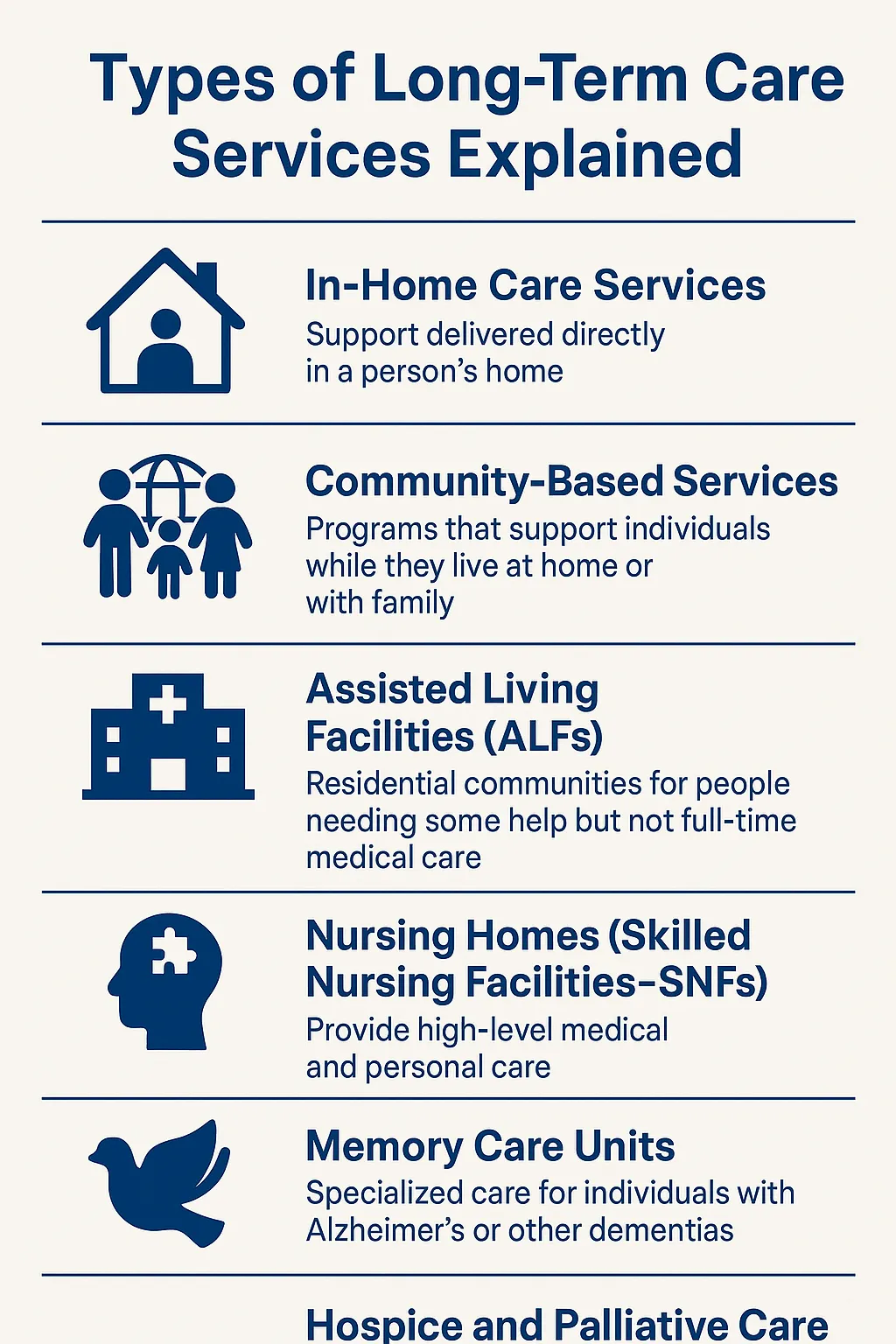
Types of Long-Term Care Services Explained
Navigating Long-Term Care Services: A Comprehensive Guide for Families and Caregivers
As our population ages, families face increasingly complex decisions about how to support older adults with dignity, safety, and the highest possible quality of life. Whether you’re a family caregiver, healthcare professional, or simply researching for a grandparent or aging parent, understanding your options for long-term care services is essential. From nursing homes to home care, adult day programs, and respite care, this guide is designed to give you the information you need—while also connecting you with valuable community services and local programs that support both seniors and caregivers.
What Are Long-Term Care Services?
Long-term care services refer to a wide range of health care and support solutions for individuals who need assistance with daily activities over an extended period. These services may be provided in a senior’s own home, a nursing facility, or a structured adult day center. Whether care is provided by a paid caregiver or through volunteering from family members, the goal is to enhance well-being and promote food security, comfort, and independence.
Services often include:
Personal care (bathing, dressing, eating)
Medical support through primary care providers
Nutrition counseling and meal preparation
Mobility assistance
Support with managing medications
Access to programs funded by the Older Americans Act
Types of Long-Term Care & Elderly Care Options
Families today can choose from several elderly care options, each designed to suit specific levels of need and independence. Common caregiver-supported solutions include:
Home Care: Ideal for seniors wishing to remain in their homes, this option often includes personal assistance and limited medical services from licensed caregivers.
Assisted Living: Offers housing and assistance with daily tasks, while promoting a social lifestyle in a community setting.
Nursing Homes: Best suited for older adults who need 24-hour nursing care, rehabilitation, or have conditions like dementia.
Memory Care: Specialized care for elders with Alzheimer’s and other cognitive challenges.
Respite Care: Temporary relief for family caregivers, ensuring their loved ones receive care while they rest, work, or travel.
Adult Day Programs: Provide social interaction, meals, and health services during daytime hours—perfect for older adults who need supervision while caregivers work.
If you're looking online for options like “daycare cerca de mi” or wondering whether to hire caregivers for in-home help, know that there are trustworthy solutions available at both state and local levels.
Financial Planning & Policy Considerations
Planning for long-term care involves more than understanding the care itself—it means navigating complex policy, asset management, and benefits like Medicare and Medicaid. You’ll also need to consider:
Capital gain implications if selling a home to fund care
Interest rates for loans or mortgage support
Coverage from insurance programs and private pay
Eligibility for Older Americans Act-funded programs
Area Agencies on Aging and certified ombudsman programs can help guide families through these challenges with transparency and up-to-date data.
Choosing the Right Path: What Families Should Know
The decision-making process can feel like a crossword puzzle—complex and full of questions. You may be comparing the cost of Dove Men+Care at the pharmacy one minute and researching “brit care dog food for comfort pets” the next. Humor aside, here’s what truly matters:
Consider health and medical needs
Involve the senior in the conversation
Seek professional advice (including from care international and state agencies)
Factor in emotional and social well-being, not just care level
Use trusted sources—not social media ads or generic app pop-ups—to gather accurate information. Avoid scams that ask for your password or offer “free caregiving” in exchange for credit info or internet sign-ups.
The Role of Education and Awareness
Aging is a shared journey—and education plays a key role in navigating it. Families benefit from learning basic vocabulary around health care, understanding the noun of “placement,” and even brushing up on English grammar to interpret policies or Hindi translations when supporting global relatives.
Resources like senior health webinars, grammar tutorials, and caregiving workshops can empower parents, caregivers, and families to advocate effectively for those they love.
Conclusion: Supporting a Senior’s Quality of Life
Caring for seniors is both a responsibility and a privilege. Whether you’re searching for long-term care for a beloved grandparent, helping a friend with babysitting their elderly parent, or exploring caregiver career paths, one thing remains true: with the right support, planning, and access to programs, aging can be a fulfilling chapter.
So whether you're navigating services like nivea creme skin care for delicate skin or evaluating rentalcar companies to transport a loved one to a facility, know that you're not alone. Trusted professionals, caregivers, and advocates are here to help you make informed, thoughtful decisions—backed by research, heart, and community.
Would you like this version broken up into a downloadable PDF, formatted for a blog, or turned into an email series?

